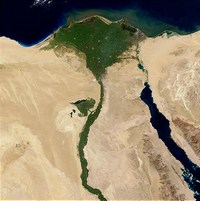If the past century’s dominant image of Ethiopia was that of an impoverished, war-torn state, epitomized by the horrendous 1984-1985 famine in Tigray and Wollo provinces, the early 21st-century picture of the country is surely exemplified by the construction of the biggest infrastructure project anywhere in Africa: Mere miles from Ethiopia’s border with Sudan, nearly 8,000 workers and engineers are laboring seven days a week, 24 hours a day as part of a round-the-clock construction schedule to erect the nearly 560-foot-tall Grand Ethiopian Renaissance Dam (GERD).
Africa’s second-most populous nation is betting that the multibillion-dollar GERD will dramatically modernize Ethiopia’s domestic political economy through mass electrification and have a positive influence on regional relations through the export of surplus power to North and East Africa and its hinterland. Late Prime Minister Meles Zenawi’s dream was for Ethiopia to emerge as a regional hegemon through energy diplomacy. His successor, Hailemariam Desalegn, has judiciously stuck to this mission and has given his dam builders all the resources and political backing required to complete the biggest hydro-infrastructure project on the Nile since the Aswan High Dam.
For Ethiopia to fund its domestic transformation through an integrated regional energy market, however, a stable Horn of Africa and Nile Basin are absolutely essential. For centuries, the region has been characterized by proxy wars and the export of internal instability by countries like Somalia, Sudan and Ethiopia itself; reversing this historical pattern requires not just high-modernist infrastructure and economic partnerships, but also a new international politics. Meles understood this, and following the 1998-2000 bloody conflict with his former comrades in arms in Eritrea, he led the Ethiopian government’s attempts to play a more positive role of peacemaker in the region.

